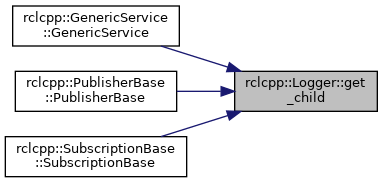Public Types | |
| enum class | Level { Unset = RCUTILS_LOG_SEVERITY_UNSET , Debug = RCUTILS_LOG_SEVERITY_DEBUG , Info = RCUTILS_LOG_SEVERITY_INFO , Warn = RCUTILS_LOG_SEVERITY_WARN , Error = RCUTILS_LOG_SEVERITY_ERROR , Fatal = RCUTILS_LOG_SEVERITY_FATAL } |
| An enum for the type of logger level. More... | |
Public Member Functions | |
| RCLCPP_PUBLIC const char * | get_name () const |
| Get the name of this logger. More... | |
| RCLCPP_PUBLIC Logger | get_child (const std::string &suffix) |
| Return a logger that is a descendant of this logger. More... | |
| RCLCPP_PUBLIC void | set_level (Level level) |
| Set level for current logger. More... | |
| RCLCPP_PUBLIC Level | get_effective_level () const |
| Get effective level for current logger. More... | |
Friends | |
| Logger | rclcpp::get_logger (const std::string &name) |
Detailed Description
Definition at line 121 of file logger.hpp.
Member Enumeration Documentation
◆ Level
|
strong |
An enum for the type of logger level.
| Enumerator | |
|---|---|
| Unset | The unset log level. |
| Debug | The debug log level. |
| Info | The info log level. |
| Warn | The warn log level. |
| Error | The error log level. |
| Fatal | The fatal log level. |
Definition at line 125 of file logger.hpp.
Member Function Documentation
◆ get_child()
| Logger rclcpp::Logger::get_child | ( | const std::string & | suffix | ) |
Return a logger that is a descendant of this logger.
The child logger's full name will include any hierarchy conventions that indicate it is a descendant of this logger. For example, get_logger('abc').get_child('def') will return a logger with name abc.def.
- Parameters
-
[in] suffix the child logger's suffix
- Returns
- a logger with the fully-qualified name including the suffix, or
- a dummy logger if this logger is invalid (e.g. because logging is disabled).
Definition at line 101 of file logger.cpp.
References rcl_logging_rosout_add_sublogger(), rcl_logging_rosout_remove_sublogger(), RCL_RET_NOT_FOUND, and RCL_RET_OK.
Referenced by rclcpp::GenericService::GenericService(), rclcpp::PublisherBase::PublisherBase(), and rclcpp::SubscriptionBase::SubscriptionBase().


◆ get_effective_level()
| Logger::Level rclcpp::Logger::get_effective_level | ( | ) | const |
Get effective level for current logger.
The effective level is determined as the severity level of the logger if it is set, otherwise it is the first specified severity level of the logger's ancestors, starting with its closest ancestor. The ancestor hierarchy is signified by logger names being separated by dots: a logger named x is an ancestor of x.y, and both x and x.y are ancestors of x.y.z, etc. If the level has not been set for the logger nor any of its ancestors, the default level is used.
- Exceptions
-
rclcpp::exceptions::RCLError if any error happens.
- Returns
- Level for the current logger.
Definition at line 159 of file logger.cpp.
References get_name(), and RCL_RET_ERROR.

◆ get_name()
|
inline |
Get the name of this logger.
- Returns
- the full name of the logger including any prefixes, or
-
nullptrif this logger is invalid (e.g. because logging is disabled).
Definition at line 166 of file logger.hpp.
Referenced by get_effective_level(), and set_level().

◆ set_level()
| void rclcpp::Logger::set_level | ( | Level | level | ) |
Set level for current logger.
- Parameters
-
[in] level the logger's level
- Exceptions
-
rclcpp::exceptions::RCLInvalidArgument if level is invalid. rclcpp::exceptions::RCLError if other error happens.
Definition at line 141 of file logger.cpp.
References get_name(), RCL_RET_ERROR, and RCL_RET_INVALID_ARGUMENT.

The documentation for this class was generated from the following files:
- rclcpp/include/rclcpp/logger.hpp
- rclcpp/src/rclcpp/logger.cpp